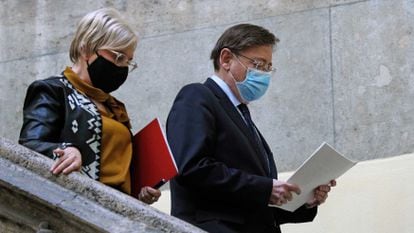Spain’s Valencia region closes bars and restaurants as Covid-19 expands ‘at extraordinary rate’
Authorities also want to bring the curfew forward to 8pm but are not contemplating home confinement
/cloudfront-eu-central-1.images.arcpublishing.com/prisa/BNBGRJGRYZFLRIU55LNC2DMZ3Q.jpg)
Authorities in the Valencia region of Spain said that all food and drink establishments will have to close for 14 days starting on Thursday. Restaurants will still be allowed to offer takeout food, while hotel cafeterias may continue to serve guests.
Sports facilities will only be open to professionals during that time. Additionally, business hours for retail stores will end at 6pm, although this schedule does not affect supermarkets, pharmacies and other businesses considered essential.
But bingo halls, betting parlors, recreational spaces for seniors, youth centers and other social venues are being forced to close entirely for 14 days. Theaters and cinemas may remain open with limited capacity.

The measures are the latest to be announced in a region where some Covid-19 patients are already being transferred to field hospitals as healthcare facilities struggle to deal with a tremendous surge in infections. The 14-day incidence rate in the region has doubled in the last 10 days to reach 896 cases per 100,000 people, around 200 points above the national average and far above the levels of the first wave in March and April last year.
“The virus is killing more than ever and it has been expanding at an extraordinary rate in recent days,” said regional premier Ximo Puig on Tuesday. “We need to observe these measures strictly.”
Puig said that he will also request permission to start the overnight curfew at 8pm instead of 10pm. The request will be made on Wednesday at a meeting of central and regional health officials.
Puig joins a growing number of regional leaders to make a similar demand. In Castilla y León, an 8pm curfew has been already approved despite the fact that 10pm is the earliest permitted time contemplated in the national state of alarm introduced in October to provide a legal framework for coronavirus restrictions that affect fundamental rights such as freedom of movement. Castilla y León’s move has led to a legal confrontation with the central government.
But the Valencian leader said there is still room for action before requesting home confinement, which he described as “an extreme measure” that creates inequality. He also defended keeping schools open, calling them “safe spaces.”
Valencia’s regional borders have been sealed since late October and will remain so at least until January 31. It was the only region of Spain not to allow cross-border travel for family gatherings over the Christmas period, although travel within the region was not limited the way it was in other regions that sealed provinces (Aragón), comarcas (Catalonia) or basic healthcare zones (Madrid).
On Monday, the Valencia government announced a €340 million plan to provide financial assistance to businesses and workers most affected by the restrictions on mobility. The region’s economy is highly dependent on tourism, which just ended its worst year since the 1970s.
English version by Susana Urra.










































